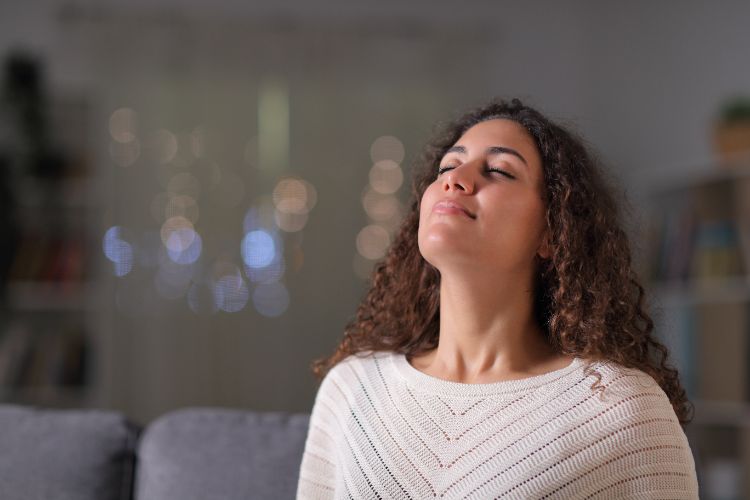If you aren't getting enough sleep at night, chances are other areas of your life are taking a hit too. Sleep deprivation has been linked to weight gain, slower brain activity and a weaker immune system, according to Healthline.
The site also reports that regularly getting less than five hours of sleep per night increases health risks by 15 percent. Many people have a difficult time falling asleep at night.
Advertisement

Shutterstock
Whether you're stressed about work, bills or family or your body just won't shut down, you may be able to get some relief with this breathing technique.

Shutterstock
The simple breathing routine is called the "4-7-8" technique.

Remedy Daily
To start, touch the tip of your tongue to the roof of your mouth (and try to keep it there the entire time). Then, breathe out, completely emptying your lungs.

Shutterstock
Close your mouth and breathe in through your nose for a count of 4. Hold your breath for a count of 7 and then blow all of the air out through your mouth forcefully for a count of 8 (you should make a whooshing sound when breathing out). Repeat for four cycles.

Shutterstock
Dr. Andrew Weil recommends doing this at least twice a day for only four breath cycles each. After the first month or so, you can increase to eight breath cycles each session.
"After two months, three months of regular practice, there are very significant changes that happen with the physiology. This lowers heart rate, it lowers blood pressure, improves digestion," Weil says.
Other Tips and Tricks
You can help ease your way into better sleep with a few other tricks from Health and Huffington Post:
Keep a sleep log

Shutterstock
Make a note of how much caffeine you drink during the day (and when), how much exercise you get, what you eat and when you go to bed and wake up. You may be able to spot correlations (like too much caffeine before bed) and adjust accordingly.
Keep it cool

Shutterstock
Turn the temperature down. Many people fall asleep faster if their rooms are colder. Try setting your thermometer to 65 degrees F (about 18 degrees C) or snag a cooling mattress.
Get moving

Shutterstock
If you can't fall asleep, get up and move for a few minutes. Sometimes the anxiety of not being able to fall asleep makes it harder to fall asleep.
Put away your screens

Shutterstock
Skip the TV and phone, though; the bright screens could keep you awake.
Turn on quiet music

Shutterstock
Keep the music slow and quiet. Listening to classical music an hour before bedtime can make it easier to fall asleep (whether it's from boredom or relaxation, the outcome is the same).
Advertisement
Note: If you suffer from chronic sleep deprivation, you should speak with a medical professional, as it could be a symptom of something more serious.

